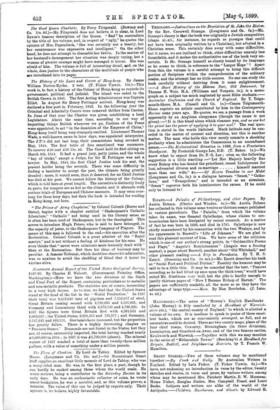"The Prince of Army Chaplains," by Colonel Colomb (Burns and
Oates), begins with a chapter entitled "Shakespeare's Catholic Literature," " Catholic " not being used in the literary sense, as It often has been used of Shakespeare, but in the theological. This serves to introduce Hugh Peters, who is said to have belonged, in the capacity of jester, to the Shakespeare Company of Players. The career of this man is followed to the end,—his execution after the Restoration. Colonel Colomb is a great admirer of the "Royal martyr," and is not without a feeling of kindness for his sons. He even thinks that "never were criminals more leniently dealt with" than at the Restoration. But then his ideas of leniency may be peculiar. A famous Tribunal, which doubtless shares his admiration, was so anxious to avoid the shedding of blood that it burnt its victims alive.






































 Previous page
Previous page